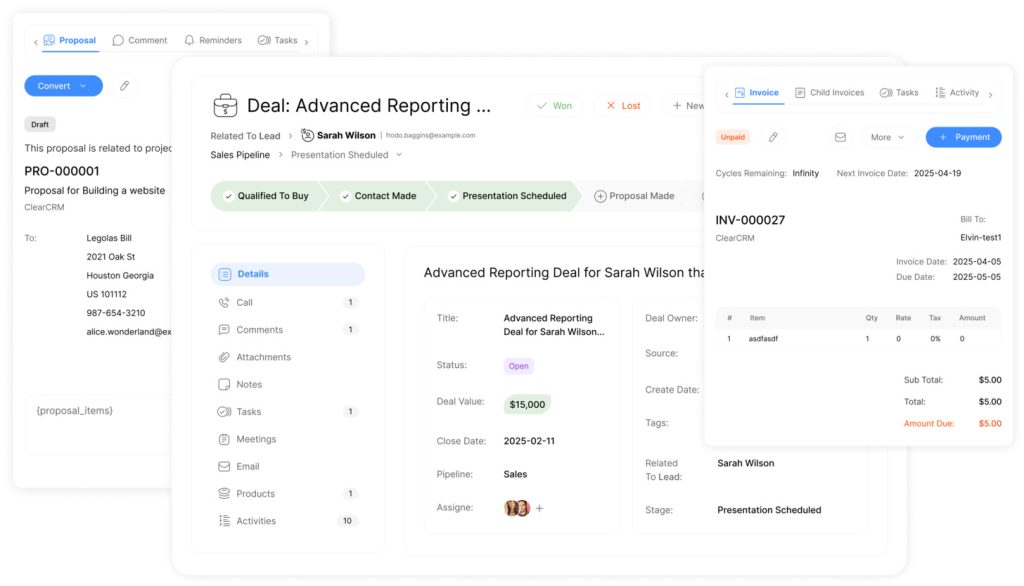Best CRM for Pharmaceutical Companies 2025: Top Solutions Compared

Top CRM Solutions for Pharmaceutical Companies Compared
We’ve analyzed the leading CRM platforms to identify which ones best serve the pharmaceutical industry’s unique needs. Our comparison focuses on essential features like compliance management, field rep coordination, and integration capabilities with other pharmaceutical systems.
| CRM Solution | Best For | Starting Price | Key Pharmaceutical Features | Compliance Tools | Mobile Access |
| ClearCRM | Small to mid-sized pharma companies | $19/user/month | Unlimited pipelines, lead tracking, automated workflows | Document management, custom fields for compliance tracking | Full mobile functionality |
| Salesforce | Enterprise pharmaceutical companies | $25/user/month | AI-powered insights, extensive customization | Validation rules, audit trails, field history tracking | Full mobile functionality |
| Microsoft Dynamics 365 | Large pharma with complex workflows | Custom pricing | Field service integration, territory planning | Advanced security, regulatory documentation | Full mobile functionality |
| HubSpot CRM | Marketing-focused pharma companies | Free (basic), $50/month (premium) | Marketing automation, content management | Limited in free version, available in premium | Full mobile functionality |
| Zoho CRM | Budget-conscious pharma startups | Free (basic), $14/user/month | Territory management, sales forecasting | Audit logs, field-level security | Full mobile functionality |
Let’s dive deeper into each of these CRM solutions to understand how they address the specific needs of pharmaceutical companies in 2025.
Understanding Pharmaceutical CRM Requirements in 2025

Pharmaceutical companies face unique challenges that standard CRM solutions often don’t address adequately. Understanding these specific requirements is crucial when selecting the right CRM platform:
Industry-Specific Challenges
- Strict regulatory compliance (FDA, HIPAA, GDPR)
- Complex sales cycles involving multiple stakeholders
- Sample management and tracking requirements
- Detailed physician and healthcare provider profiling
- Territory management for field representatives
Essential CRM Features for Pharma
- Compliance documentation and audit trails
- Key opinion leader (KOL) relationship tracking
- Sample inventory management and e-signatures
- Mobile access for field representatives
- Integration with medical databases and ERP systems
With these requirements in mind, let’s examine how each of our top CRM solutions addresses the specific needs of pharmaceutical companies.
ClearCRM: Best Overall CRM for Small to Mid-Sized Pharmaceutical Companies

ClearCRM stands out as the top choice for pharmaceutical companies seeking a balance of affordability, customization, and industry-specific functionality. With its intuitive interface and comprehensive feature set, ClearCRM addresses the unique challenges faced by pharmaceutical sales and marketing teams.
Advantages
- Unlimited sales pipelines for different product lines and territories
- Advanced lead assignment and routing for field representatives
- Customizable workflows for compliance documentation
- Document management and e-signature capabilities
- Affordable pricing starting at $19/user/month
- White label branding options for enterprise users
Limitations
- Newer to the market than some competitors
- Limited third-party integrations (expanding in 2025)
- Advanced features require higher-tier plans
Key Features for Pharmaceutical Companies
Lead Management
ClearCRM offers unlimited custom fields for tracking healthcare provider specialties, prescribing habits, and facility affiliations. The platform’s advanced lead assignment ensures representatives are matched with the right healthcare providers based on territory and specialty.
Document Compliance
With built-in document management and e-signature capabilities, ClearCRM simplifies regulatory compliance. Store important documents, collect signatures electronically, and maintain audit trails for all interactions—essential for pharmaceutical compliance.
Workflow Automation
ClearCRM’s automation tools streamline repetitive tasks like follow-up scheduling, sample tracking notifications, and compliance documentation. The Growth and Scale plans offer unlimited workflow automations to maximize team efficiency.
Pricing and Plans
ClearCRM offers flexible pricing options that scale with your pharmaceutical business:
- Free Plan: Basic CRM features with limited records (ideal for testing)
- Starter Plan: $19/user/month with unlimited contacts and custom fields
- Growth Plan: $39/user/month with marketing automation and email sequences
- Scale Plan: $79/user/month with document management, e-signatures, and advanced reporting
Ready to Transform Your Pharmaceutical Sales Process?
Start managing your healthcare provider relationships, compliance documentation, and sales pipelines more effectively with ClearCRM’s pharmaceutical-focused solution.
Salesforce: Enterprise-Grade CRM for Pharmaceutical Giants
Salesforce continues to be a dominant force in the CRM industry, offering a highly customizable platform suitable for large pharmaceutical enterprises with complex needs. Its robust architecture and extensive integration capabilities make it a powerful choice for companies with sophisticated sales and marketing requirements.
Advantages
- AI-powered insights via Einstein AI for predictive analytics
- Extensive third-party integrations with pharmaceutical systems
- Comprehensive automation for marketing, sales, and customer service
- Advanced security and compliance features
- Robust mobile application for field representatives
Limitations
- Significantly higher cost than competitors
- Complex implementation requiring specialized consultants
- Steep learning curve for new users
- Can be overwhelming for smaller pharmaceutical companies
Key Features for Pharmaceutical Companies
Salesforce offers several specialized features that address pharmaceutical industry needs:
- Health Cloud: Purpose-built for healthcare and pharmaceutical companies with patient relationship management
- Validation Rules: Enforce data quality and compliance standards across all records
- Territory Management: Advanced tools for defining and managing sales territories
- Sample Management: Track and manage pharmaceutical samples with complete audit trails
While Salesforce offers unmatched capabilities for enterprise pharmaceutical companies, its high cost and complexity make it less suitable for smaller organizations with limited IT resources and budgets.
Microsoft Dynamics 365: Integrated Solution for Complex Pharmaceutical Operations
Microsoft Dynamics 365 combines CRM and Enterprise Resource Planning (ERP) capabilities, offering a versatile solution for pharmaceutical companies with complex operational needs. Its seamless integration with Microsoft’s productivity suite makes it particularly valuable for organizations already invested in the Microsoft ecosystem.
Advantages
- Field service integration for coordinating pharmaceutical representatives
- Advanced territory planning and management capabilities
- Seamless integration with Microsoft Office tools
- Robust security and compliance features
- AI-driven insights for sales forecasting and lead prioritization
Limitations
- Custom pricing model can be expensive for smaller companies
- Complex implementation requiring specialized expertise
- Less intuitive interface compared to newer CRM solutions
- Marketing automation capabilities less developed than sales features
Key Features for Pharmaceutical Companies
Microsoft Dynamics 365 offers several features particularly valuable for pharmaceutical operations:
- Field Service Management: Coordinate field representatives with integrated scheduling and routing
- Regulatory Documentation: Maintain comprehensive records for compliance purposes
- Customer Insights: Analyze healthcare provider data for targeted engagement
- Power BI Integration: Create sophisticated analytics dashboards for sales performance
Microsoft Dynamics 365 is best suited for larger pharmaceutical organizations with complex workflows and existing investments in Microsoft technologies. Its comprehensive capabilities come with higher implementation costs and complexity.
HubSpot CRM: Marketing-Focused Solution for Pharmaceutical Companies
HubSpot CRM, widely adopted across industries, also holds potential for pharmaceutical firms focused on content-driven engagement. It provides excellent tools for marketing, sales, and customer service with a focus on inbound marketing strategies.
Advantages
- Strong marketing automation capabilities for nurturing healthcare provider relationships
- Content management system for creating educational materials
- Free basic version available for small teams
- Intuitive, user-friendly interface requiring minimal training
- Email tracking and live chat features for real-time engagement
Limitations
- Limited pharmaceutical-specific features in base platform
- Premium features require significant investment
- Less customizable than enterprise solutions like Salesforce
- Data model not ideal for complex operational use cases
Key Features for Pharmaceutical Companies
HubSpot offers several features valuable for pharmaceutical marketing and sales:
- Marketing Hub: Create targeted campaigns for different healthcare provider segments
- Content Management: Develop and distribute educational materials and research
- Meeting Scheduler: Simplify appointment booking with healthcare providers
- Email Sequences: Automate follow-up communications with consistent messaging
HubSpot is ideal for pharmaceutical companies focusing on content marketing and educational outreach to healthcare providers. While it lacks some industry-specific features, its marketing capabilities make it valuable for companies with strong digital strategies.
Zoho CRM: Budget-Friendly Option for Pharmaceutical Startups
Zoho CRM stands out for its affordability and versatility, offering a comprehensive suite of features tailored to meet diverse business needs in the pharmaceutical sector. Zoho CRM offers a wide range of CRM features, including audit logs, task workflows, and physician engagement history management.
Advantages
- Affordable pricing with free tier for small teams
- AI assistant (Zia) for automating routine tasks
- Territory management capabilities for field representatives
- Omnichannel communication integration
- Customizable workflows and detailed reporting
Limitations
- Less pharmaceutical-specific functionality
- Limited third-party integrations compared to Salesforce
- Mobile app less robust than some competitors
- Advanced features require higher-tier plans
Key Features for Pharmaceutical Companies
Zoho CRM offers several features valuable for pharmaceutical operations:
- Territory Management: Organize and assign healthcare providers by geographic region
- Sales Forecasting: Predict revenue based on pipeline and historical data
- Audit Logs: Maintain records of system changes for compliance purposes
- Custom Modules: With extensive customization options, you can configure modules for physician targeting, sample tracking, and document routing
Zoho CRM is an excellent choice for pharmaceutical startups and smaller companies looking for a balance of functionality and affordability. While it may lack some enterprise-level features, its customization options allow it to adapt to most pharmaceutical sales processes.
Comparing CRM Solutions for Different Pharmaceutical Business Needs
Different pharmaceutical companies have varying needs based on their size, focus, and operational complexity. Here’s how our top CRM solutions compare across key pharmaceutical industry requirements:
| Business Need | Best CRM Solution | Why It’s Ideal |
| Small Pharma Startups | ClearCRM or Zoho CRM | Affordable pricing, essential features, easy implementation |
| Field Rep Management | ClearCRM or Microsoft Dynamics 365 | Territory planning, mobile access, scheduling automation |
| Regulatory Compliance | Salesforce or ClearCRM (Scale plan) | Document management, audit trails, e-signatures |
| Healthcare Provider Marketing | HubSpot CRM | Content management, email campaigns, engagement tracking |
| Complex Enterprise Operations | Salesforce or Microsoft Dynamics 365 | Advanced customization, integration capabilities, scalability |
Key Considerations When Choosing a Pharmaceutical CRM
Compliance and Security
Pharmaceutical companies must prioritize CRM solutions that offer robust compliance features, including audit trails, field-level security, and documentation management. ClearCRM’s Scale plan and Salesforce provide strong compliance capabilities essential for regulated environments.
Implementation and Training
Consider the resources required for implementation and user adoption. While Salesforce and Microsoft Dynamics 365 offer comprehensive capabilities, they require significant implementation effort. ClearCRM and HubSpot provide more straightforward setup experiences with intuitive interfaces.
Scalability
Evaluate how the CRM will grow with your pharmaceutical business. ClearCRM offers tiered plans that scale with your needs, while enterprise solutions like Salesforce provide virtually unlimited scalability for larger organizations.
Total Cost of Ownership
Look beyond monthly subscription costs to consider implementation, customization, and ongoing maintenance expenses. ClearCRM and Zoho offer the best value for smaller pharmaceutical companies, while enterprise solutions require larger investments.
Implementation Best Practices for Pharmaceutical CRM Success

Successfully implementing a CRM in a pharmaceutical company requires careful planning and execution. Here are key best practices to ensure a smooth transition and maximize ROI:
1. Define Clear Objectives
Establish specific goals for your CRM implementation, such as improving field rep productivity, enhancing compliance documentation, or streamlining sample management. These objectives will guide your implementation strategy and help measure success.
2. Staged Implementation
Implement your pharmaceutical CRM in phases rather than attempting a complete rollout at once. Start with core functionality like contact management and gradually add more complex features like workflow automation and compliance tracking.
3. Data Migration Strategy
Develop a comprehensive plan for migrating existing healthcare provider data, interaction history, and compliance documentation. Ensure data is cleaned and standardized before migration to maintain accuracy and compliance.
4. Compliance Validation
Work with your legal and compliance teams to validate that your CRM configuration meets all regulatory requirements for pharmaceutical companies, including data privacy, sample tracking, and interaction documentation.
5. Field Rep Training
Develop comprehensive training programs for field representatives, focusing on mobile access, compliance documentation, and efficient data entry. Consider creating role-specific training modules for different team members.
6. Integration Planning
Map out integrations with other pharmaceutical systems, including ERP, sample management, and medical databases. Prioritize integrations based on business impact and implementation complexity.
Following these implementation best practices will help ensure your pharmaceutical CRM deployment delivers maximum value while maintaining compliance with industry regulations.
Future Trends in Pharmaceutical CRM for 2025 and Beyond

The pharmaceutical CRM landscape continues to evolve rapidly. Here are the key trends shaping the future of pharmaceutical CRM solutions in 2025 and beyond:
AI-Powered Engagement
Artificial intelligence is transforming how pharmaceutical companies engage with healthcare providers. Advanced CRM systems now offer predictive analytics to identify the best engagement strategies for different physician segments, optimal timing for outreach, and personalized content recommendations based on specialties and interests.
ClearCRM’s AI tools, available in their Growth and Scale plans, provide pharmaceutical companies with automated content generation and predictive lead scoring to prioritize high-value healthcare provider relationships.
Enhanced Compliance Automation
As regulatory requirements continue to evolve, pharmaceutical CRM systems are incorporating more sophisticated compliance automation. This includes automatic flagging of potential compliance issues, streamlined sample tracking with blockchain verification, and automated generation of required documentation.
ClearCRM’s document management and e-signature capabilities in the Scale plan help pharmaceutical companies maintain compliance while reducing administrative burden on sales representatives.
Virtual Engagement Tools
The shift toward virtual engagement with healthcare providers is accelerating. Modern pharmaceutical CRMs now include integrated video conferencing, virtual detail aids, and digital sample requests. These tools enable representatives to maintain relationships with healthcare providers through multiple channels.
Advanced Analytics and Insights
Data-driven decision making is becoming central to pharmaceutical sales and marketing. Next-generation CRM platforms offer sophisticated analytics dashboards that provide insights into prescribing patterns, engagement effectiveness, and territory performance to optimize resource allocation.
As these trends continue to shape the pharmaceutical CRM landscape, companies that adopt forward-looking solutions like ClearCRM will be best positioned to navigate industry changes and maintain competitive advantage.
Pharmaceutical CRM Success Stories

Mid-Sized Specialty Pharma
Challenge:
A specialty pharmaceutical company with 50 field representatives struggled with inconsistent data entry, limited visibility into healthcare provider interactions, and compliance documentation gaps.
Solution:
Implemented ClearCRM’s Growth plan with custom fields for specialty-specific tracking, automated workflow for compliance documentation, and mobile access for field representatives.
Results:
- 42% increase in documented healthcare provider interactions
- 89% reduction in compliance documentation errors
- 28% improvement in sales representative productivity
- Full implementation completed in just 6 weeks
Pharmaceutical Startup
Challenge:
A newly launched pharmaceutical company needed an affordable CRM solution that could scale with their growth while ensuring compliance with industry regulations from day one.
Solution:
Started with ClearCRM’s Starter plan and gradually upgraded to the Scale plan as their team expanded from 5 to 25 representatives over 18 months.
Results:
- Successfully tracked 10,000+ healthcare provider relationships
- Maintained perfect compliance record during regulatory audit
- Reduced administrative time by 15 hours per rep monthly
- Scaled CRM capabilities without disrupting operations
These case studies demonstrate how pharmaceutical companies of different sizes have leveraged CRM solutions to address their specific challenges and achieve measurable business results.
Frequently Asked Questions About Pharmaceutical CRM Solutions
How does a pharmaceutical CRM differ from standard CRM solutions?
Pharmaceutical CRMs include specialized features for regulatory compliance, sample management, and healthcare provider relationship tracking. They typically offer more robust documentation capabilities, field rep management tools, and integration with medical databases. Standard CRMs lack these industry-specific features essential for pharmaceutical companies.
What compliance features should I look for in a pharmaceutical CRM?
Key compliance features include audit trails for all interactions, sample tracking and management, electronic signature capabilities, field-level security, role-based permissions, and documentation management. ClearCRM’s Scale plan offers comprehensive compliance features including document management, e-signatures, and detailed audit logs.
How long does it typically take to implement a CRM for a pharmaceutical company?
Implementation timelines vary based on company size and complexity. Small pharmaceutical companies can implement ClearCRM in 2-4 weeks, while mid-sized organizations typically require 4-8 weeks. Enterprise implementations of solutions like Salesforce or Microsoft Dynamics 365 can take 3-6 months or longer due to complex customization and integration requirements.
Can pharmaceutical CRMs integrate with sample management systems?
Yes, most pharmaceutical CRMs offer integration capabilities with sample management systems. ClearCRM provides custom field options and document management features that can be configured to track samples, while enterprise solutions like Salesforce offer more extensive integration options with specialized sample management platforms.
What is the best CRM for pharmaceutical companies with limited IT resources?
ClearCRM and Zoho CRM are excellent options for pharmaceutical companies with limited IT resources. Both offer intuitive interfaces, straightforward implementation processes, and comprehensive support resources. ClearCRM’s tiered pricing model allows companies to start with essential features and expand as needed without requiring extensive technical expertise.
Conclusion: Choosing the Best CRM for Your Pharmaceutical Company in 2025

Selecting the right CRM for your pharmaceutical company is a critical decision that impacts sales effectiveness, compliance, and overall operational efficiency. After comprehensive analysis of the leading solutions in 2025, ClearCRM emerges as the best overall choice for small to mid-sized pharmaceutical companies seeking a balance of affordability, pharmaceutical-specific functionality, and ease of use.
While enterprise pharmaceutical companies with complex requirements may benefit from Salesforce or Microsoft Dynamics 365, and marketing-focused organizations might prefer HubSpot, ClearCRM offers the most balanced solution for the majority of pharmaceutical companies. Its unlimited pipelines, customization options, document management capabilities, and affordable pricing make it an excellent choice for optimizing pharmaceutical sales and marketing operations.
As the pharmaceutical industry continues to evolve, having a flexible, compliant, and user-friendly CRM will be essential for maintaining competitive advantage. ClearCRM’s ongoing development of AI tools and workflow automation positions it as a forward-looking solution ready to address the challenges of pharmaceutical sales and marketing in 2025 and beyond.
Transform Your Pharmaceutical Sales Process Today
Join the growing number of pharmaceutical companies using ClearCRM to streamline operations, ensure compliance, and boost sales performance. Get started with a free trial and see the difference for yourself.

